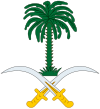波斯灣阿拉伯國家

波斯灣阿拉伯國家由兩王國(巴林和沙烏地)、一蘇丹國(阿曼)及三酋長國(科威特、卡達和阿聯)所組成。 該六國同時是海灣阿拉伯國家合作委員會成員。該地區有阿拉伯國家聯盟七個成員國:巴林、科威特、伊拉克、阿曼、卡達、沙烏地阿拉伯和阿聯。[1][2][3]
這個詞在不同的上下文中被用來指該地區的一些阿拉伯國家。著名的地區政治聯盟海灣合作委員會,包括巴林、科威特、阿曼、卡達、沙烏地阿拉伯和阿聯。[4][5][6]歷史上,大英帝國統治下的波斯灣國家[7][8][9] 和最終形成阿拉伯聯合大公國的停戰諸國。[10][11][12]
| 國旗 | 國徽 | 國名 | 官方名稱 | 政治體制 | |
|---|---|---|---|---|---|
| 英語名稱 | 標準阿拉伯語名稱 | ||||
 |
 |
巴林王國 | Kingdom of Bahrain | Mamlakat al-Baḥrayn | 君主專制 |
 |
 |
科威特國 | State of Kuwait | Dawlat al-Kuwayt | 二元制君主立憲制 世襲君主制 |
 |
 |
阿曼蘇丹國 | Sultanate of Oman | Saltanat ʻUman | 君主專制 |
| 卡達國 | State of Qatar | Dawlat Qaṭar | 君主專制 | ||
 |
 |
沙烏地阿拉伯王國 | Kingdom of Saudi Arabia | Al-Mamlaka al-ʻArabiyya as-Suʻūdiyya | 君主專制 |
 |
 |
阿拉伯聯合大公國 | United Arab Emirates | Al-Imārāt al-『Arabīyah al-Muttaḥidah | 聯邦君主制a |
| a 其政體是事實上而非法律上。 | |||||
由於波斯灣阿拉伯國家的經濟結構及文化相似,很多時會作為一個整體來討論。
2017年6月5日,巴林突然宣布與被指支持恐怖組織的卡達斷交,其後沙烏地阿拉伯、阿聯等六個國家亦宣布與卡達斷交且封閉海陸空交通,導致卡達陷入外交危機,此危機直至2021年1月5日方告解除。
經濟[編輯]
石油和天然氣是波斯灣阿拉伯國家的主要收入來源。由於人口相對稀少,使當地的人均收入較相鄰地區高。為應付勞工短缺問題,該地區從南亞和東南亞(主要是菲律賓和印尼)引入大量非移民臨時勞工;以往主要引入約旦(大部分為巴勒斯坦人)和埃及勞工。
採珠和珍珠業曾是該地區(尤其是巴林、卡達和科威特)的主要經濟活動,但已隨著日本等地的養珠業在1930年代起盛行而衰落。
文化[編輯]
波斯灣阿拉伯國家的文化相似,被稱作khaleeji(海灣)文化。居民使用阿拉伯語,也有類似的音樂特色(sawt、fijiri、ardha、liwa等)、食物、服飾等。大部分居住波斯灣的阿拉伯人的祖先均來自各阿拉伯部落。
該六國均為世襲君主制,幾乎沒有代議政制。只有巴林王國和科威特國的議會有民選代表。沙烏地阿拉伯和卡達是自1932年和1971年各自建國以來從未舉行過選舉並實行君主專制的兩個阿拉伯國家。[13]
外部閱讀[編輯]
- 波斯灣阿拉伯國家歷史 (頁面存檔備份,存於網際網路檔案館)
- J. E. Peterson (1998), The Arab Gulf States: Steps Toward Political Participation, ISBN 0-275-92881-0
- Anoushiravan Ehteshami and Steven Wright (2007), Reform in the Middle East Oil Monarchies, ISBN 978-0863723230
- F. Gregory, III Gause (1994), Oil Monarchies: Domestic and Security Challenges in the Arab Gulf States, ISBN 0-87609-151-6
- Atif A. Kubursi (1984), Oil, Industrialization and Development in the Arab Gulf States, ISBN 0-7099-1566-7
- Gordon Robison (1996), Lonely Planet: Arab Gulf States, ISBN 0-86442-390-X
參閱[編輯]
- ^ Mary Ann Tétreault; Gwenn Okruhlik; Andrzej Kapiszewski. Political Change in the Arab Gulf States: Stuck in Transition. 2011 [2021-10-18]. (原始內容存檔於2021-12-22).
作者首先關注七個海灣國家的政治:巴林、伊拉克、科威特、阿曼、卡達、沙烏地阿拉伯和阿聯。
- ^ World Migration 2005 Costs and Benefits of International Migration. International Organization for Migration. 2005: 53 [2021-10-18]. ISBN 9788171885503. (原始內容存檔於2021-11-21).
- ^ U.S. Official to Tour Persian Gulf Arab Lands. The New York Times. 1987 [2021-10-18]. (原始內容存檔於2021-12-13).
A leading American diplomat will start a trip to Iraq and six other Arab countries of the Persian Gulf region this week to discuss the Iran-Iraq war, Administration officials said today.
- ^ Hertog, Steffen. Arab Gulf States : an assessment of nationalisation policies. 2014 [12 May 2021]. (原始內容存檔於2021-10-18).
- ^ Peterson, J. E. Life after Oil: Economic Alternatives for the Arab Gulf States. Duke University Press. 2009 [13 May 2021].
- ^ Gulf countries. European Commission. [13 May 2021]. (原始內容存檔於2021-11-21).
海灣合作委員會國家——巴林、科威特、阿曼、卡達、沙烏地阿拉伯和阿聯——是歐盟農產品出口的重要市場。
- ^ Onley, James. Britain and the Gulf Shaikhdoms, 1820-1971: The Politics of Protection. CIRS Occasional Papers. 2009 [16 May 2021].[失效連結]
- ^ Watt, D. C. Britain and the Future of the Persian Gulf States. The World Today (Royal Institute of International Affairs). 1964, 20 (11): 488–496 [16 May 2021]. (原始內容存檔於2021-10-22).
- ^ Albaharna, Husain. The Legal Status of the Arabian Gulf States. A Study of their Treaty Relations and their International Problems. International & Comparative Law Quarterly (Manchester University Press). April 1969, 18 (2): 518 – 519 [12 May 2021]. (原始內容存檔於2021-11-21).
- ^ Bey, Frauke. From Trucial States to United Arab Emirates. UK: Longman. 1996: 296–297. ISBN 978-0-582-27728-1.
- ^ Balfour-Paul, G., The End of Empire in the Middle East: Britain's Relinquishment of Power in her Last Three Arab Dependencies, Cambridge University Press, 1984, ISBN 978-0-521-46636-3
- ^ Barnwell, Kristi Nichole. From trucial states to nation state : decolonization and the formation of the United Arab Emirates, 1952-1971. The University of Texas at Austin. 2011 [16 May 2021]. (原始內容存檔於2021年11月21日).
對于波斯灣阿拉伯酋長國的統治者來說,威爾遜的宣布標誌著英國軍事保護的結束,也標誌著最終導致1971年12月3日阿拉伯聯合大公國成立的談判進程的開始。對波斯灣各個國家成為主權聯邦的過程進行考察,提供了一個考察民族主義和反帝國主義在聯盟建立中所起作用的機會。
- ^ Robbers, Gerhard. Encyclopedia of world constitutions, Volume 1. 2007: 791. ISBN 978-0-8160-6078-8.
